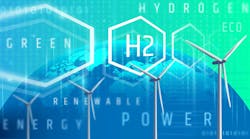Can Open Source Accelerate AI Innovation for Energy Systems?
What you’ll learn:
- A Linux Foundation white paper delves into open-source software architectures and design practices that could accelerate the development and optimization of AI-based energy-management systems.
- Critical topics in the report include establishing robust data governance practices, investing in AI-based digital twins and data platforms, and the advantages of using open-source platforms.
LF Energy recently announced the release of a new white paper, "Unlocking AI’s Potential for the Energy Transition Through Open Source.” As the global energy sector undergoes a critical transformation driven by decarbonization, digitalization, and decentralization, artificial intelligence (AI) has emerged as a key enabler for optimizing energy systems.
The white paper explains why open-source technology, and the innovations they make possible, are essential to accelerating AI adoption in the energy industry and delivering on its promises.
In support of this trend, the paper documents the state of AI readiness in the energy industry, use cases for AI within energy systems, initiatives to increase AI adoption for energy, and the impact and promise of open source for accelerating this work. It also explains why energy stakeholders must adopt a strategic approach to AI readiness by:
- Establishing robust data governance to enable AI innovation and deployment.
- Investing in digital twins and data platforms based on open-source shared components to support AI initiatives.
- Supporting open, realistic datasets to fuel AI model development with third-party innovators and researchers.
- Promoting AI literacy in the organization and workforce to help power systems make the most of AI tools and technologies as well as support AI experts in navigating and understanding energy-specific knowledge and challenges.
The paper was compiled by Alexandre Parisot, LF Energy Director of Ecosystem, AI & Energy Systems, with contributions from Lucian Balea (RTE), Gus Chadney (Centre for Net Zero), Sheng Chai (Centre for Net Zero), Boris Dolley (RTE), Virginie Dordonnat (RTE), Abder Elandaloussi (Southern California Edison), Mital Kanabar (GE), David Lamers (Alliander), Vincent Lefieux (RTE), Francois Miralles (Hydro-Quebec), Camille Pache (RTE), and Pedro Vergara Barrios (TU Delft).
Next in This Edition of PowerBites
More PowerBites
About the Author
Lee Goldberg
Contributing Editor
Lee Goldberg is a self-identified “Recovering Engineer,” Maker/Hacker, Green-Tech Maven, Aviator, Gadfly, and Geek Dad. He spent the first 18 years of his career helping design microprocessors, embedded systems, renewable energy applications, and the occasional interplanetary spacecraft. After trading his ‘scope and soldering iron for a keyboard and a second career as a tech journalist, he’s spent the next two decades at several print and online engineering publications.
Lee’s current focus is power electronics, especially the technologies involved with energy efficiency, energy management, and renewable energy. This dovetails with his coverage of sustainable technologies and various environmental and social issues within the engineering community that he began in 1996. Lee also covers 3D printers, open-source hardware, and other Maker/Hacker technologies.
Lee holds a BSEE in Electrical Engineering from Thomas Edison College, and participated in a colloquium on technology, society, and the environment at Goddard College’s Institute for Social Ecology. His book, “Green Electronics/Green Bottom Line - A Commonsense Guide To Environmentally Responsible Engineering and Management,” was published by Newnes Press.
Lee, his wife Catherine, and his daughter Anwyn currently reside in the outskirts of Princeton N.J., where they masquerade as a typical suburban family.
Lee also writes the regular PowerBites series.





